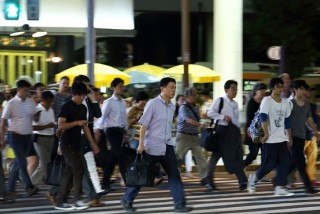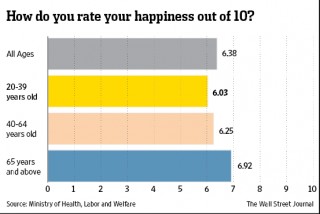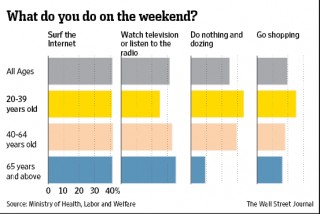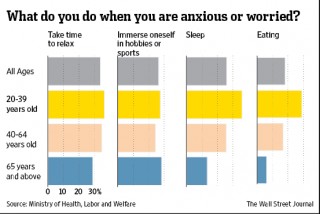Loading
Search
▼ Japanese young people are not happy, according to these charts
- Category:Other

A new survey by Japan’s health ministry shows that Japan’s younger people are overworked and more exhausted than their elders. Here are the highlights in three charts:

1. Young adults are unhappier than older people.
Japanese between the ages of 20 and 39 rated their happiness at 6.03 out of 10, compared with 6.25 for those between the ages of 40 and 64, and 6.92 for people over 65.
Among the youngest set, work-related stress was a big cause of unhappiness. Respondents who said they weren’t stressed about relations with coworkers and work rated their happiness at 6.59 out of 10, compared with 5.79 for those who said they were.

2. Young Japanese spend their weekends doing pretty much nothing.
After a stressful work week, what do you do when the weekend finally arrives? More than a third of respondents, or 34.2%, between 20 and 39 said they spent days off “doing nothing and dozing.” That compared with 25.0% for all ages, and was the second-biggest time-killer for the youngest cohort behind “surfing the Internet.”
You can’t criticize them too much however, since surfing the Internet was the biggest pastime for all age groups (41.5%). Older generations, however, spent more time watching television and reading. The 65-and-over cohort were also the most physically active, with 31.2% saying they exercised, did sports or walked, compared with 10.8% of the youngest group.

3. Young Japanese deal with anxiety by turning into couch potatoes (and the health ministry isn’t happy about it).
The two biggest stress relievers for people between 20 and 39 are relaxing and sleeping, with 36.5% of respondents saying they “took some time to relax” when they were anxious or worried, and 35.9% saying they slept. Eating came in third at 28.9%, 10 percentage points higher than the average for all ages. Relaxing also took the top spot for all ages, although it was followed by “immersing oneself in sports and hobbies.” The question was asked to people who said that they always or sometimes felt anxiety or worry.
The health ministry chided: “Simply relaxing is not rest. Rest is recovering from the physical and mental fatigue of work and other activities. It is necessary to pay attention to not just getting back to one’s original energy level, but also raising one’s spirits for the day ahead and improving health socially, mentally and physically.”
The survey collected responses from 5,000 people between the ages of 20 and 80 in February. The results were released as part of the ministry’s yearly white paper.
(source and pictures : wsj.com)
- August 18, 2014
- Comment (0)
- Trackback(0)

